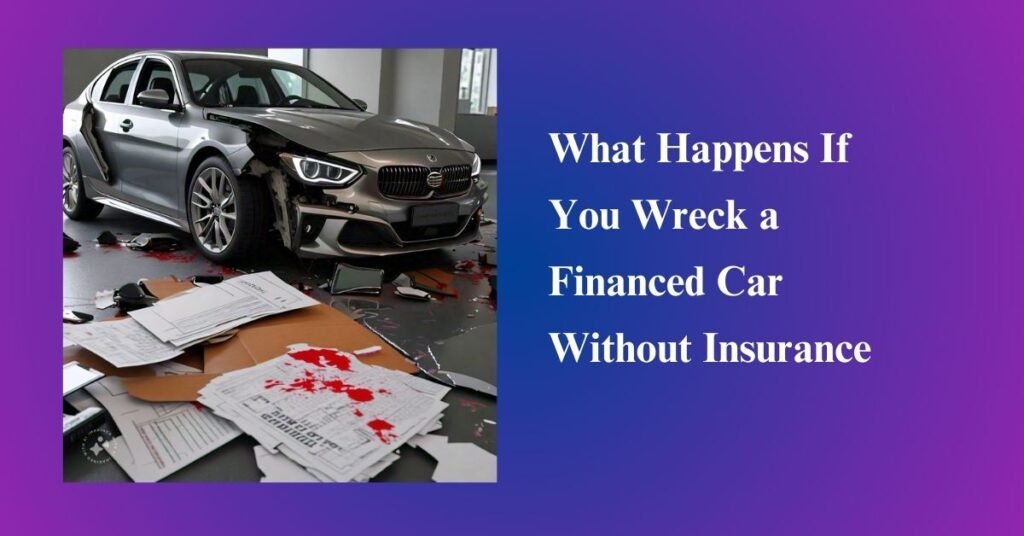If you have a financed car, it means you borrowed money to buy it, and you still owe that money. If you wreck this car and do not have insurance, you could face a lot of financial problems. In this article, we will explain what happens in this situation, what you should do, and how to protect yourself in the future.
Understanding Financing a Car
Before we dive into the consequences of wrecking a financed car without insurance, let’s understand what it means to finance a car.
When you finance a car, you take out a loan to buy it. You make monthly payments to the bank or lender until you pay off the loan. The car itself serves as collateral, which means if you do not make your payments, the lender can take the car back.
What Does Insurance Cover?
Car insurance is designed to help protect you financially in the event of an accident. There are different types of insurance, but here are the most common:
- Liability Insurance: This covers damage you cause to other people or their property.
- Collision Insurance: This helps pay for repairs to your car after an accident, regardless of who is at fault.
- Comprehensive Insurance: This covers non-collision-related incidents, such as theft or natural disasters.
If you wreck your car without insurance, you will not have any coverage to help pay for repairs or replacement costs.
The Financial Consequences of Wrecking a Financed Car Without Insurance
Wrecking a financed car without insurance can lead to severe financial repercussions. Not only will you be responsible for repaying the original loan on the vehicle, but you’ll also have to contend with the additional burden of purchasing or financing a new car, which can be a significant expense. This situation can quickly spiral out of control, leaving you in a precarious financial position.
If the accident was caused by another party, you may have options to mitigate these costs. In such cases, the insurance of the at-fault driver should cover your damages. This includes not only the costs of repairing or replacing your vehicle but also other financial impacts such as lost wages due to missed work, medical expenses incurred as a result of the accident, and any additional costs related to your recovery. Navigating this process can be complex, but understanding your rights can help you secure the compensation you deserve.
1. You Still Owe Money on the Loan
Even if your car is wrecked, you still have to pay back the loan. This means you must continue making monthly payments, even if you no longer have a car to drive. This can lead to a difficult situation where you have to find a way to pay for a new car while still paying off the loan for the wrecked one.
2. Cost of Repairs or Replacement
If you wreck your car and do not have insurance, you will need to pay for repairs or find a way to buy a new car. The cost of repairs can be high, depending on how badly the car was damaged. If the car is deemed a total loss, you will need to buy a new one, which can be very expensive.
3. Impact on Credit Score
If you cannot pay your car loan after wrecking your car, this can negatively impact your credit score. A lower credit score can make it harder for you to borrow money in the future or get a new car loan.
What to Do If You Wreck Your Financed Car Without Insurance
If you find yourself in this unfortunate situation, here are the steps you should take:
1. Stay Calm and Assess the Situation
First, make sure you and anyone else involved are safe. If there are injuries, call for medical help immediately. Then, assess the damage to your car and the other vehicles involved.
2. Contact Your Lender
Next, reach out to your lender as soon as possible. Inform them of the accident and discuss your options. They may be able to offer solutions, such as adjusting your payment plan or giving you advice on what to do next.
3. Consider Your Options for Repairs or Replacement
If your car is repairable, get quotes from different repair shops to understand how much it will cost. If the car is totaled, you will need to consider buying a new or used vehicle. Look for affordable options that fit your budget.
4. Explore Your Legal Options
If the accident was caused by another driver, you may be able to file a claim against their insurance. This can help cover your repair costs, medical expenses, and other damages. It is essential to gather evidence from the accident scene, such as photos and witness statements, to support your claim.
What If Someone Else Caused the Accident?
If another driver caused the accident, their insurance should help cover your expenses. You can file a claim against their policy for damages. This may include:
- Repair or replacement costs for your car
- Medical expenses for injuries you sustained
- Lost wages if you cannot work due to injuries
Steps to Take:
- Collect Evidence: Take pictures of the accident scene, the cars involved, and any injuries. Obtain witness contact information.
- File a Claim: Contact the at-fault driver’s insurance company to file a claim. Provide them with the evidence you collected.
- Follow Up: Keep track of your claim’s progress and communicate with the insurance adjuster.
How to Protect Yourself in the Future
To avoid getting into a similar situation in the future, consider the following tips:
1. Get Insurance Coverage
Always have car insurance, especially if you are financing your vehicle. Consider a comprehensive policy that covers accidents, theft, and other damages.
2. Know Your Coverage
Understand what your insurance policy covers. This knowledge can help you make informed decisions in case of an accident.
3. Save for Emergencies
Create an emergency fund to help cover unexpected expenses, such as repairs or a down payment on a new car. Having savings can provide peace of mind and financial security.
4. Consider Gap Insurance
Gap insurance can help cover the difference between what you owe on your loan and the current market value of your car if it gets totaled. This can be particularly helpful if you financed a vehicle with little to no down payment.
What Happens if You Crash a Rental Car Without Insurance?
Conclusion
Wrecking a financed car without insurance can lead to significant financial challenges. You will still owe money on the loan, and you may face high repair or replacement costs. However, if someone else caused the accident, their insurance might cover your expenses.
The best way to protect yourself is to ensure you have adequate insurance coverage, understand your policy, and save for emergencies. By taking these steps, you can avoid potential financial hardship in the future.
If you ever find yourself in this situation, remember to stay calm, communicate with your lender, and explore your options for recovery. Being informed and prepared can make a difference when facing unexpected challenges on the road.
Final Thoughts
Car accidents can happen to anyone, and understanding the financial implications of wrecking a financed car without insurance is crucial. By knowing your rights and responsibilities, you can navigate these challenges more effectively. Always prioritize safety and financial preparedness to protect yourself in the long run.

